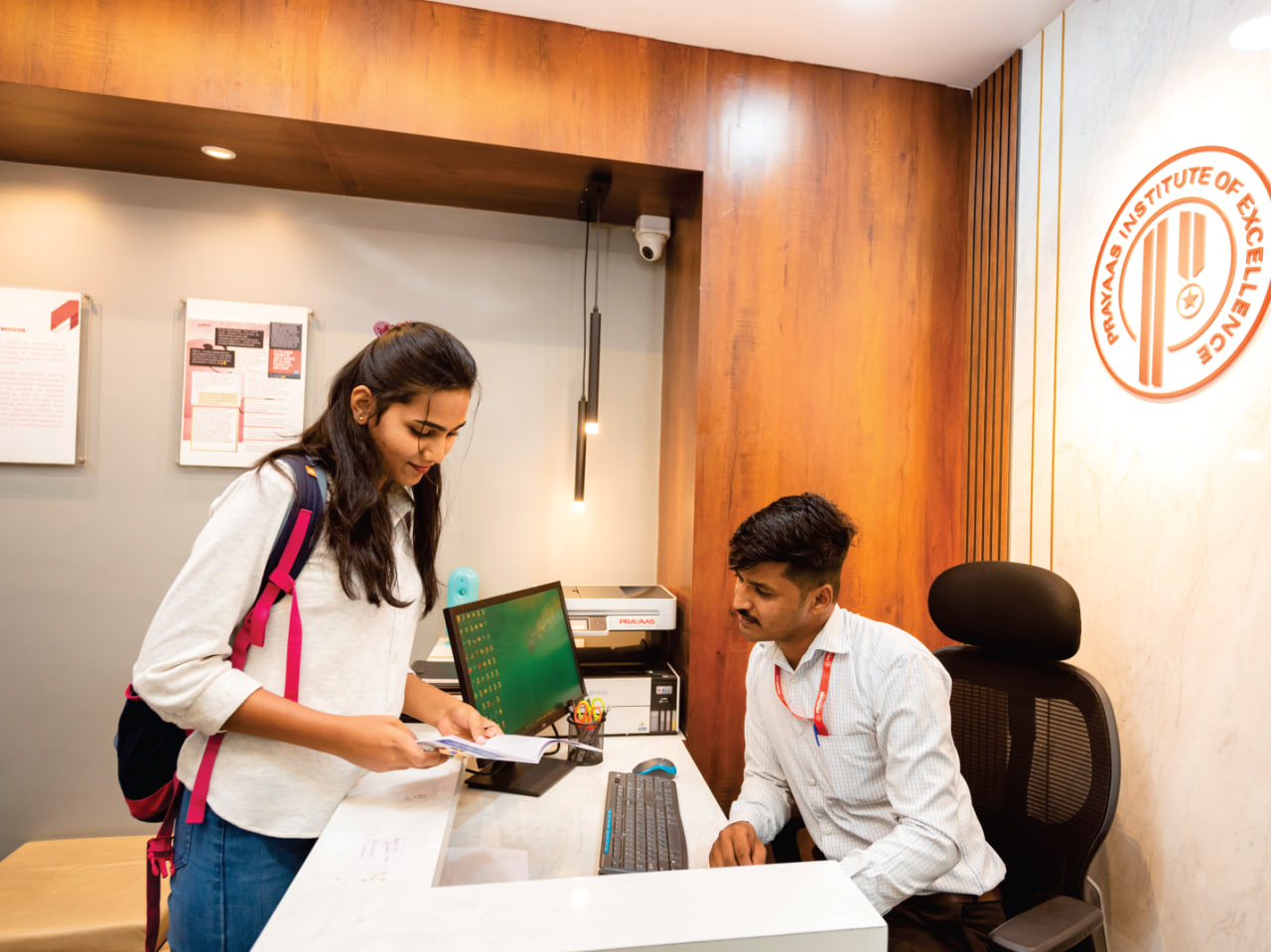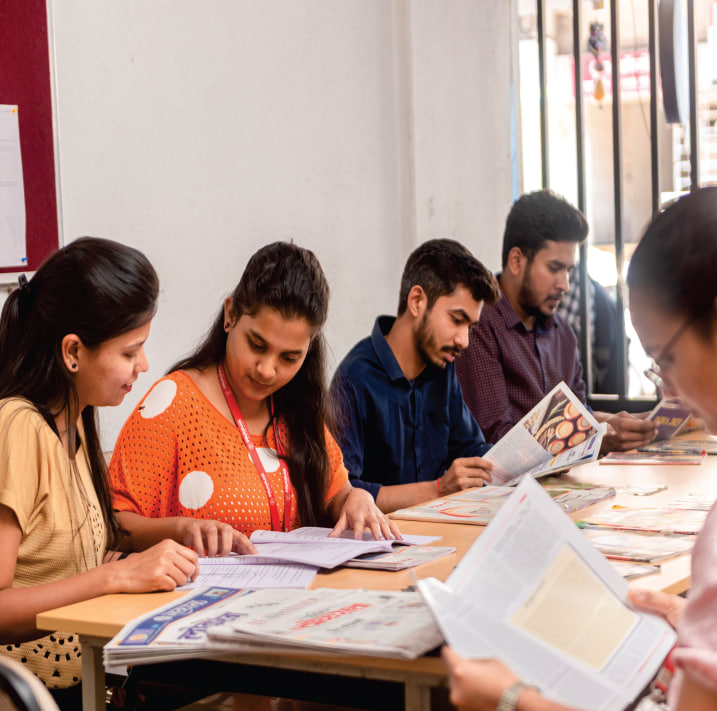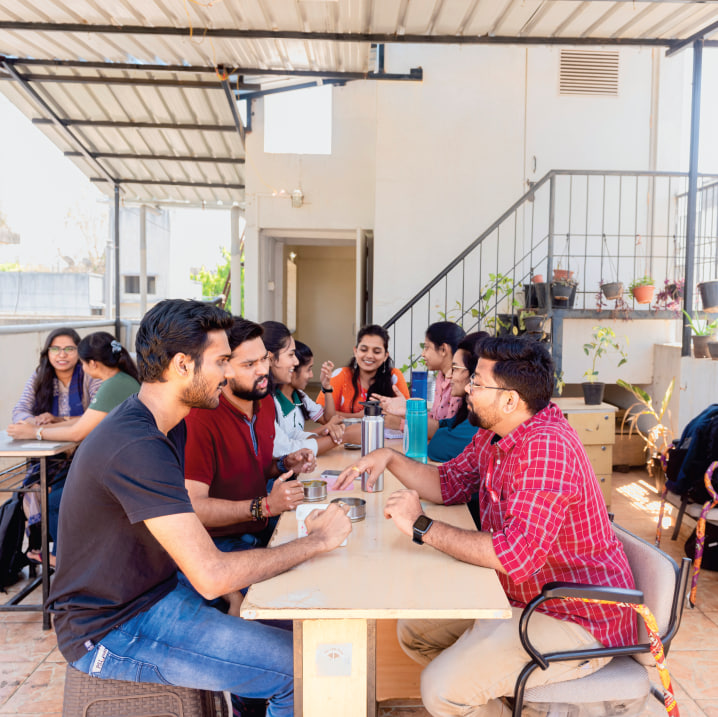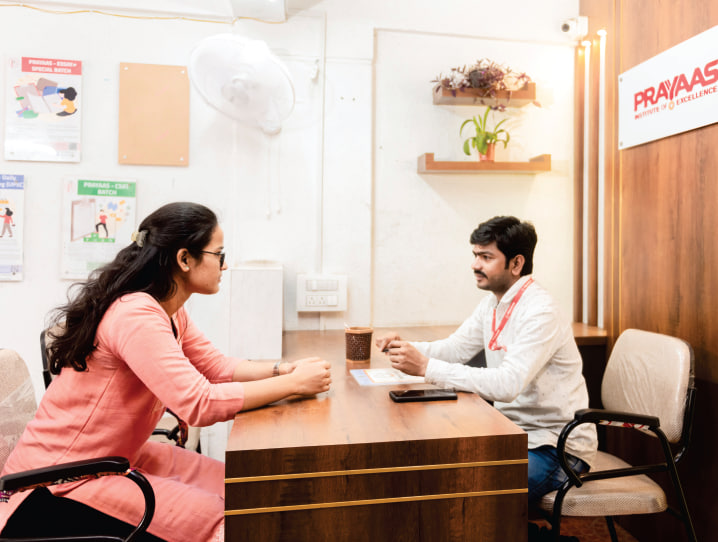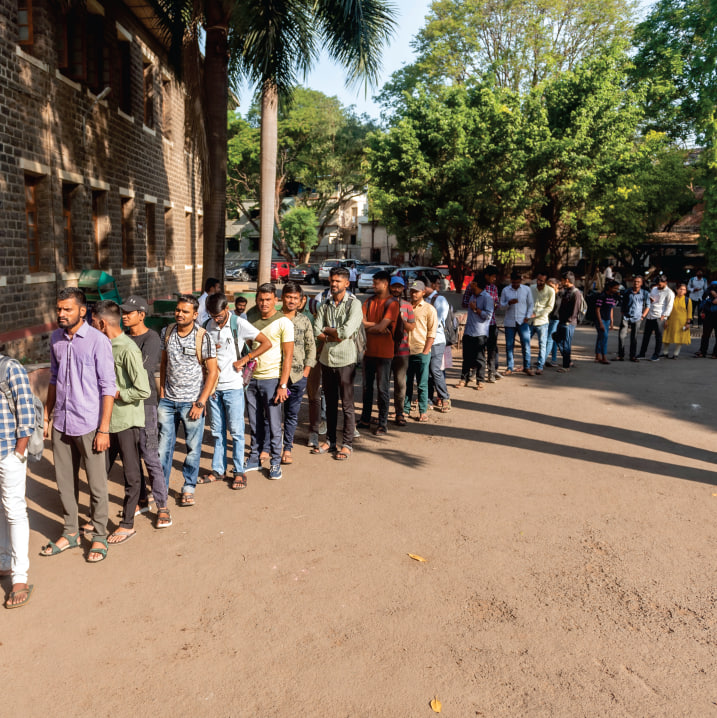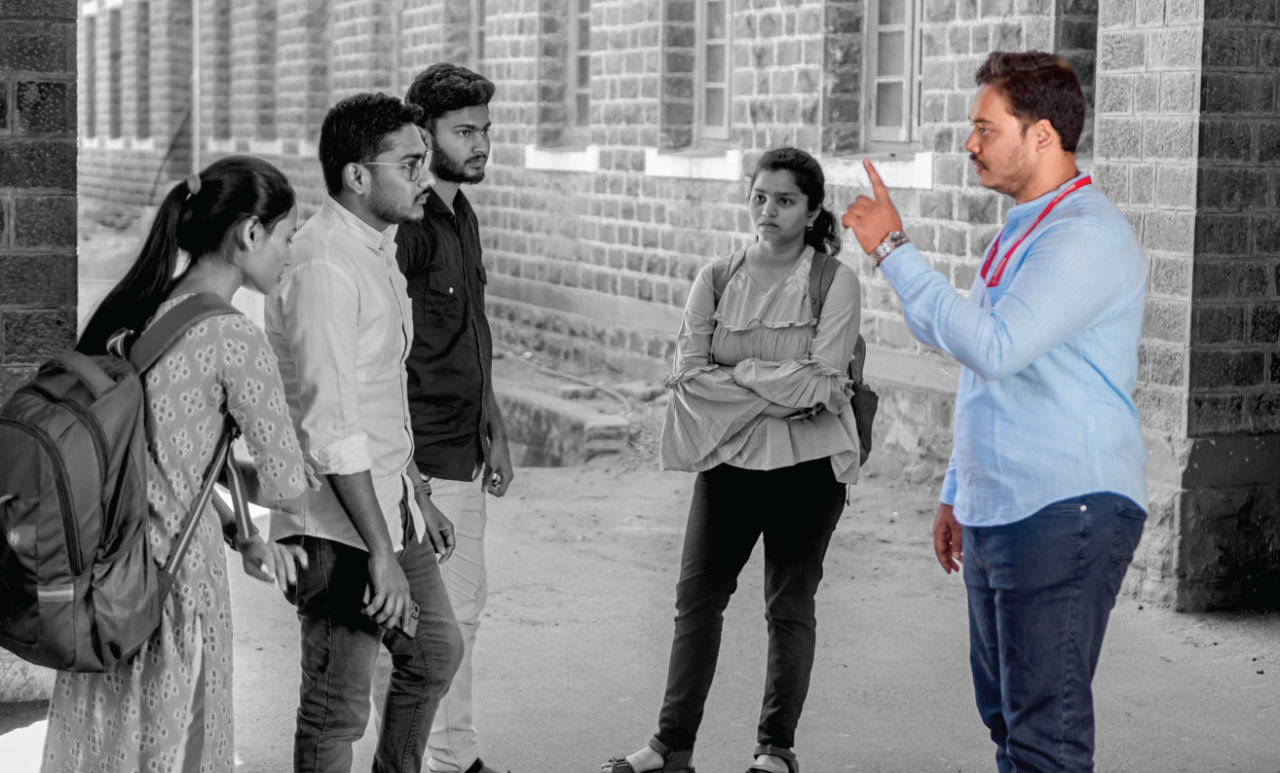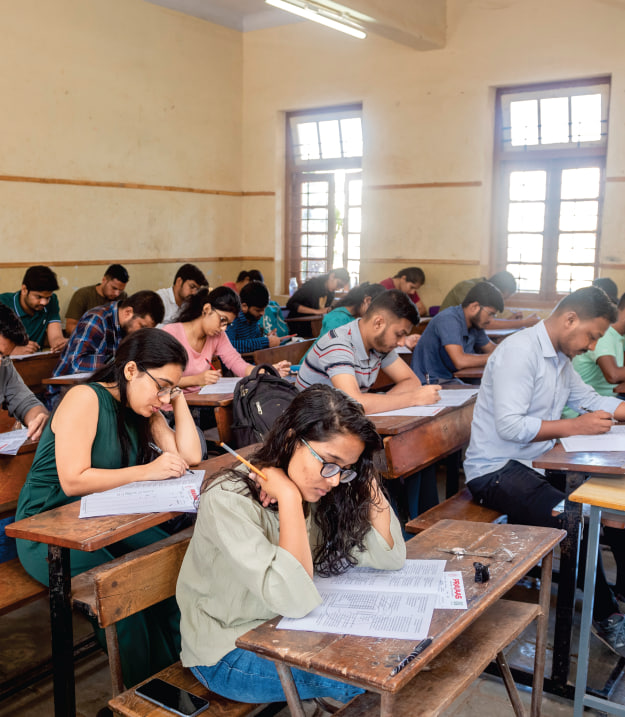UPSC
Various Exam Conducted By UPSC
Civil Services Examination
1About UPSC CSE
Purpose: The UPSC CSE is conducted to select candidates for various civil services positions in the Indian government, including the Indian Administrative Service (IAS), Indian Foreign Service (IFS), Indian Police Service (IPS), and other central government services.
Exam Stages: The UPSC CSE consists of three stages:
a. Preliminary Examination: This is the first stage of the CSE. It comprises two objective-type papers: General Studies Paper-I and General Studies Paper-II (also known as the Civil Services Aptitude Test or CSAT). The marks obtained in the preliminary examination are only for qualification to the main examination and are not counted for the final ranking.
b. Main Examination: Candidates who qualify in the preliminary examination move on to the main examination. It consists of nine descriptive papers, including one qualifying paper in any Indian language and an English language paper. The other papers cover various subjects such as General Studies, Essay, and optional subjects chosen by the candidates.
c. Personality Test (Interview): Candidates who clear the main examination are called for a personality test, which is commonly known as the interview. It assesses the candidate's overall personality, suitability for a career in the civil services, and knowledge on various subjects.
2Eligibility criteria
Nationality: The candidate must be either:
a. A citizen of India, or
b. A subject of Nepal or Bhutan, or
c. A Tibetan refugee who came to India before January 1, 1962, with the intention of permanently settling in India, or
d.A person of Indian origin who has migrated from Pakistan, Burma, Sri Lanka, East African countries of Kenya, Uganda, the United Republic of Tanzania, Zambia, Malawi, Zaire, Ethiopia, or Vietnam with the intention of permanently settling in India.
Age Limit:
The age requirements vary based on the category of the candidate. As of the 2021 notification, the age limits are as follows:
a. General Category: The candidate must have attained the age of 21 years and must not have exceeded 32 years as of August 1 of the examination year.
b. OBC (Other Backward Classes) Category: The maximum age limit is relaxable by three years, i.e., the candidate must not have exceeded 35 years.
c. SC/ST (Scheduled Caste/Scheduled Tribe) Category: The maximum age limit is relaxable by five years, i.e., the candidate must not have exceeded 37 years.
d. Defence Services Personnel disabled during military operations:The maximum age limit is relaxable by three years, i.e., the candidate must not have exceeded 35 years.
e. Ex-servicemen including commissioned officers and ECOs/SSCOs (Emergency Commissioned Officers/Short Service Commissioned Officers) who have rendered at least five years of military service as of August 1 of the examination year: The maximum age limit is relaxable by five years, i.e., the candidate must not have exceeded 37 years.
f. PwBD (Persons with Benchmark Disability) Category: The maximum age limit is relaxable as per the category-specific rules.
Number of Attempts allowed
General Category: General category candidates are allowed a maximum of six attempts to appear for the UPSC CSE.
OBC (Other Backward Classes) Category: OBC category candidates have a maximum of nine attempts to appear for the UPSC CSE.
SC/ST (Scheduled Caste/Scheduled Tribe) Category: SC/ST category candidates have unlimited attempts until they reach the upper age limit.
PwBD (Persons with Benchmark Disability) Category:
a. General and OBC category PwBD candidates: They have a maximum of nine attempts.
SC/ST category PwBD candidates: They have unlimited attempts until they reach the upper age limit.
EWS (Economically Weaker Section) Category: As of the 2021 notification, there is no specific information available regarding the number of attempts for EWS category candidates. It is advisable to refer to the official UPSC notification for the specific year to get the latest information.
3UPSC – CSE List of Services (Post Offered)
All India Services:
a. Indian Administrative Service (IAS)
b. Indian Police Service (IPS)
c. Indian Forest Service (IFS)
Central Services (Group A):
a. Indian Foreign Service (IFS)
b. Indian Audit and Accounts Service (IAAS)
c. Indian Revenue Service (IRS)
d. Indian Customs and Central Excise Service (ICCES)
e. Indian Defence Accounts Service (IDAS)
f. Indian Revenue Service (IRS) - Income Tax
g. Indian Civil Accounts Service (ICAS)
h. Indian Ordnance Factories Service (IOFS)
i. Indian Postal Service (IPoS)
j. Indian Information Service (IIS)
k. Indian Trade Service (ITS)
l. Railway Traffic Service (IRTS)
m. Railway Accounts Service (IRAS)
n. Railway Personnel Service (IRPS)
o. Indian Railway Service of Engineers (IRSE)
p. Indian Railway Service of Signal Engineers (IRSSE)
q. Indian Railway Service of Mechanical Engineers (IRSME)
r. Indian Railway Stores Service (IRSS)
s. Indian Railway Service of Electrical Engineers (IRSEE)
t. Indian Railway Service of Medical Officers (IRSME)
u. Central Engineering Service (CES)
v. Central Armed Police Forces (CAPF)
Central Services (Group B):
a. Armed Forces Headquarters Civil Service
b. Delhi, Andaman and Nicobar Islands Civil Service (DANICS)
c. Pondicherry Civil Service (PONDICS)
d. Andaman and Nicobar Islands Police Service (ANIPS)
e. Pondicherry Police Service (PONDIPS)
Please note that this is not an exhaustive list, and there are other services and positions that candidates can be appointed to based on their ranks and preferences in the UPSC CSE. The final allocation of services is based on the merit-cum-preference system, where the candidate's rank in the examination determines their choice of service.
Combined Defence Services
1About CDS
The UPSC CDS (Combined Defence Services) exam is a prestigious examination conducted by the Union Public Service Commission (UPSC) in India. It is held twice a year to select candidates for officer-level positions in the Indian Army, Navy, and Air Force.
The CDS exam consists of a two-stage selection process: a written examination and an interview conducted by the Services Selection Board (SSB). The written exam is divided into three papers: English, General Knowledge, and Elementary Mathematics. The English paper assesses candidates' language skills and comprehension abilities. The General Knowledge paper tests their knowledge of current affairs, history, geography, and other relevant subjects. The Elementary Mathematics paper evaluates their mathematical proficiency in areas like arithmetic, algebra, trigonometry, and geometry.
Candidates who clear the written exam are called for the SSB interview. The interview process comprises various stages, including psychological tests, group tasks, personal interviews, and a medical examination. The interview assesses candidates' personality traits, leadership qualities, communication skills, and overall suitability for a career in the defence services.
Successful candidates are then admitted to training academies like the Indian Military Academy (IMA), Indian Naval Academy (INA), Air Force Academy (AFA), or Officers' Training Academy (OTA), depending on their preferences and ranks.
To prepare for the CDS exam, candidates must study a wide range of subjects, including English grammar and vocabulary, current affairs, history, geography, mathematics, and general science. Regular practice, solving previous years' question papers, and taking mock tests are essential for effective preparation.
Physical fitness is also a crucial aspect, and candidates need to meet the prescribed standards to be eligible for the defence services.
The CDS exam provides a gateway for aspirants to join the armed forces and serve the nation as commissioned officers, making it a highly sought-after and competitive examination in India.
2Eligibility criteria
The eligibility criteria for the UPSC CDS (Combined Defence Services) exam are as follows:
Nationality: Candidates must be one of the following:
A citizen of India, or
A subject of Bhutan or Nepal, or
A Tibetan refugee who came to India before January 1, 1962, with the intention of permanently settling in India, or
A person of Indian origin who has migrated from Pakistan, Burma, Sri Lanka, East African countries of Kenya, Uganda, the United Republic of Tanzania, Zambia, Malawi, Zaire, Ethiopia, or Vietnam with the intention of permanently settling in India.
Age Limit:
For Indian Military Academy (IMA): Unmarried male candidates must be between 19 and 24 years old.
For Indian Naval Academy (INA): Unmarried male candidates must be between 19 and 22 years old.
For Air Force Academy (AFA): Unmarried male candidates must be between 19 and 23 years old.
For Officers' Training Academy (OTA): Male and female candidates (married or unmarried) must be between 19 and 25 years old.
Educational Qualifications:
For Indian Military Academy and Officers' Training Academy: Candidates must possess a bachelor's degree from a recognized university or institution.
For Indian Naval Academy: Candidates must have a bachelor's degree in engineering from a recognized university or institution.
For Air Force Academy: Candidates must have a bachelor's degree from a recognized university or institution with Physics and Mathematics as subjects in 10+2 or equivalent.
Physical Fitness:
Candidates must meet the physical standards set by the respective defence services. These standards include requirements related to height, weight, visual acuity, and general physical fitness.
It is important to note that the eligibility criteria may vary for different academies and services, so it is advisable to refer to the official notification or the UPSC website for the specific and up-to-date eligibility requirements for the CDS exam.
Combined Defence Services
1About CDS
The UPSC CDS (Combined Defence Services) exam is a prestigious examination conducted by the Union Public Service Commission (UPSC) in India. It is held twice a year to select candidates for officer-level positions in the Indian Army, Navy, and Air Force.
The CDS exam consists of a two-stage selection process: a written examination and an interview conducted by the Services Selection Board (SSB). The written exam is divided into three papers: English, General Knowledge, and Elementary Mathematics. The English paper assesses candidates' language skills and comprehension abilities. The General Knowledge paper tests their knowledge of current affairs, history, geography, and other relevant subjects. The Elementary Mathematics paper evaluates their mathematical proficiency in areas like arithmetic, algebra, trigonometry, and geometry.
Candidates who clear the written exam are called for the SSB interview. The interview process comprises various stages, including psychological tests, group tasks, personal interviews, and a medical examination. The interview assesses candidates' personality traits, leadership qualities, communication skills, and overall suitability for a career in the defence services.
Successful candidates are then admitted to training academies like the Indian Military Academy (IMA), Indian Naval Academy (INA), Air Force Academy (AFA), or Officers' Training Academy (OTA), depending on their preferences and ranks.
To prepare for the CDS exam, candidates must study a wide range of subjects, including English grammar and vocabulary, current affairs, history, geography, mathematics, and general science. Regular practice, solving previous years' question papers, and taking mock tests are essential for effective preparation.
Physical fitness is also a crucial aspect, and candidates need to meet the prescribed standards to be eligible for the defence services.
The CDS exam provides a gateway for aspirants to join the armed forces and serve the nation as commissioned officers, making it a highly sought-after and competitive examination in India.
2Eligibility criteria
The eligibility criteria for the UPSC CDS (Combined Defence Services) exam are as follows:
Nationality: Candidates must be one of the following:
A citizen of India, or
A subject of Bhutan or Nepal, or
A Tibetan refugee who came to India before January 1, 1962, with the intention of permanently settling in India, or
A person of Indian origin who has migrated from Pakistan, Burma, Sri Lanka, East African countries of Kenya, Uganda, the United Republic of Tanzania, Zambia, Malawi, Zaire, Ethiopia, or Vietnam with the intention of permanently settling in India.
Age Limit:
For Indian Military Academy (IMA): Unmarried male candidates must be between 19 and 24 years old.
For Indian Naval Academy (INA): Unmarried male candidates must be between 19 and 22 years old.
For Air Force Academy (AFA): Unmarried male candidates must be between 19 and 23 years old.
For Officers' Training Academy (OTA): Male and female candidates (married or unmarried) must be between 19 and 25 years old.
Educational Qualifications:
For Indian Military Academy and Officers' Training Academy: Candidates must possess a bachelor's degree from a recognized university or institution.
For Indian Naval Academy: Candidates must have a bachelor's degree in engineering from a recognized university or institution.
For Air Force Academy: Candidates must have a bachelor's degree from a recognized university or institution with Physics and Mathematics as subjects in 10+2 or equivalent.
Physical Fitness:
Candidates must meet the physical standards set by the respective defence services. These standards include requirements related to height, weight, visual acuity, and general physical fitness.
It is important to note that the eligibility criteria may vary for different academies and services, so it is advisable to refer to the official notification or the UPSC website for the specific and up-to-date eligibility requirements for the CDS exam.
3Services Offered through UPSC – CDS Exam
The UPSC CDS (Combined Defence Services) exam offers candidates the opportunity to join various prestigious defence services in India as commissioned officers. The services offered through the CDS exam are as follows:
Indian Army:
Candidates who clear the CDS exam and choose the Indian Army as their preferred service can join the Indian Military Academy (IMA) in Dehradun for officer training. Upon successful completion of the training, they are commissioned as officers in the Indian Army.
Indian Navy:
Candidates opting for the Indian Navy can join the Indian Naval Academy (INA) in Ezhimala for officer training. After completing the training, they are commissioned as officers in the Indian Navy and can serve in various branches like the Executive Branch, Engineering Branch, Electrical Branch, etc.
Indian Air Force:
Candidates interested in the Indian Air Force can join the Air Force Academy (AFA) in Hyderabad for officer training. After successful completion of the training, they are commissioned as officers in the Indian Air Force and can serve as pilots or in various technical and non-technical branches.
Officers' Training Academy (OTA):
Candidates who prefer a Short Service Commission (non-technical) can join the Officers' Training Academy (OTA) in Chennai. Upon completion of the training, they are commissioned as officers in the Indian Army and serve for a specified period.
It's important to note that candidates have the option to prioritize their preferences for the services while applying for the CDS exam, based on their career aspirations and eligibility criteria.
The CDS exam provides an opportunity for candidates to join the defence services and serve the nation in various capacities, with roles ranging from combat operations to administrative and technical roles in the armed forces.
4 Examination Calender – 2023
5 Syllabus
6 Previous Year Questions
Previous Year Question Papers (PYQs) play a crucial role in the preparation for the UPSC CDS exam. Please refer the link below to get the PYQ’s:
7 Answer Keys
Refer the link below to get the official answer keys of UPSC-CDS exam
8 How to Prepare
Preparing for the UPSC CDS (Combined Defence Services) exam requires a well-planned strategy and dedicated effort. Here's a brief preparation strategy:
Understand the Syllabus:
Familiarize yourself with the syllabus of the CDS exam, covering topics like English, General Knowledge, and Elementary Mathematics. Break down each subject into subtopics and create a study plan accordingly.
Study Material:
Collect the relevant study material, including textbooks, reference books, previous years' question papers, and online resources. Choose reliable sources that cover the entire syllabus comprehensively.
Create a Study Schedule:
Plan your study schedule effectively, allocating sufficient time for each subject and topic. Make sure to balance your study time with regular breaks to avoid burnout.
English Proficiency:
Enhance your English language skills by reading newspapers, magazines, and quality books. Practice grammar, vocabulary, and comprehension exercises. Work on improving your writing skills as well.
General Knowledge:
Stay updated with current affairs by reading newspapers, watching news channels, and referring to reliable sources. Focus on areas like history, geography, science, economics, and defense-related topics. Make notes for quick revision.
Mathematics Preparation:
Develop a strong foundation in mathematics by understanding the basic concepts and formulas. Practice solving a wide range of mathematical problems from different topics. Solve previous years' question papers and take mock tests regularly.
Mock Tests and Revision:
Regularly take mock tests to assess your preparation and identify areas that need improvement. Analyze your performance and work on your weak areas. Revise the studied topics regularly to reinforce your knowledge.
Time Management and Exam Strategies:
Practice time management during the exam. Solve questions strategically, attempting the easier ones first. Develop techniques to quickly solve problems and manage your time effectively.
Physical Fitness:
Along with academic preparation, focus on maintaining physical fitness. Engage in regular exercise, participate in outdoor activities, and follow a healthy lifestyle. Physical fitness is crucial for the selection process.
Stay Motivated and Stay Positive:
The CDS exam is challenging, so maintain a positive mind-set and stay motivated throughout the preparation. Seek guidance from mentors or join coaching institutes if required.
Remember, consistency and perseverance are key to success in the CDS exam. Stay disciplined, maintain a structured approach, and believe in your abilities. Best of luck!
9 Resources to Prepare
To prepare for the UPSC CDS (Combined Defense Services) exam, you can utilize various resources that will help you in your preparation. Here are some recommended resources:
Official UPSC Website:
The official website of the Union Public Service Commission (UPSC) provides valuable information about the CDS exam, including the syllabus, exam pattern, eligibility criteria, and previous years' question papers. It is an essential resource for understanding the exam structure and requirements.
NCERT Books:
The National Council of Educational Research and Training (NCERT) books for subjects like History, Geography, Science, and Mathematics are highly recommended for building a strong foundation. They cover the basic concepts in a comprehensive manner and are useful for both preliminary and in-depth study.
Newspapers and Magazines:
Reading newspapers like The Hindu, The Indian Express, and magazines like Pratiyogita Darpan, Yojana, and Frontline will help you stay updated with current affairs and improve your knowledge of national and international events.
Reference Books:
Some recommended reference books for the CDS exam include "Pathfinder for CDS" by Arihant Publications, "Objective General English" by S.P. Bakshi, "Lucent's General Knowledge" by Dr. Binay Karna, "Quantitative Aptitude for Competitive Examinations" by R.S. Aggarwal, and "High School English Grammar and Composition" by Wren and Martin.
Online Study Materials and Mock Tests:
Numerous websites and online platforms provide study materials, video lectures, and mock tests specifically designed for the CDS exam. Online Websites offer comprehensive study materials, quizzes, and mock tests that can help in your preparation.
Previous Years' Question Papers:
Solving previous years' question papers will familiarize you with the exam pattern and types of questions asked. It will also help you identify the important topics and areas that require more focus.
Coaching Institutes:
Joining a reputable coaching institute that offers specialized CDS exam preparation can provide guidance, expert faculty, study materials, and mock tests to enhance your preparation.
Remember, while using these resources, it is important to have a structured study plan, consistent practice, and self-evaluation. Adapt your preparation strategy according to your strengths and weaknesses, and focus on regular revisions and mock tests to gauge your progress.
Central Armed Police Force
1About CAPF
Purpose- CAPF exam is held for recruitment in police forces such as Border Security Force (BSF), Central Reserve Police Force (CRPF), Indo-Tibetan Border Police (ITBP), Central Industrial Security Force (CISF), Sashastra Seema Bal (SSB), National Security Guard (NSG), and Assam Rifles (AR).
Exam stages-
Written Examination- The written examination is held by UPSC and it consists of basically two papers. The examination will be conducted in an offline mode.
a.Paper I: General Ability and Intelligence- Paper I will be held from 10 a.m. to 12.00 Noon. It is consisted of 250 Marks. The questions in this paper will be of Objective (Multiple Answers) Type in which the questions will be set in Hindi and English.
Paper II: General Studies, Essay and Comprehension (200 Marks)- Paper II will be held from 2.00 p.m. to 5.00 p.m. In this paper candidates will be allowed the option of writing the Essay Component in English or Hindi, but the medium of Precis Writing, Comprehension Components and other communications/ language skills will be English only.
2.Physical Standards/Physical Efficiency Tests and Medical Standards Tests- Candidates who meet the criteria and cut off of written tests are qualified to give physical standards test. To meet physical standards, candidates will have to give Physical Efficiency Test (PET). The PET consists of following test-
| PET Tests | Female | Male |
|---|---|---|
| 100 m Race | Max. 18 Minutes | Max. 16 Seconds |
| 800 m Race | Max. 4 Minutes 45 Seconds | Max. 3 Minutes 45 Seconds |
| Short-Put (7.26 Kg) | Nil | 4.5 m |
| Long Jump | 3 m (Max. 3 Chances are given) | 3.5 m (Max. 3 Chances are given) |
Important Note- Pregnant Females are not allowed to give Physical Efficiency Test.
3.Interview/ Personality Test- Interview round consists of 150 Marks. Candidates who are deemed fit and who qualify for the Medical Standard Test will be called for final round of selection that is Personality Test. This round is helpful to check the suitability of candidates by a UPSC Panel.
2Eligibility criteria
Nationality: Candidates must be one of the following:
Candidates must be a Citizen of India.
A Subject of Bhutan and Nepal.
Any other Country (Such Candidates can appear for exam only if they have written consent from the Central Government.
Age Limit:
The Minimum age to appear for the exam is 20 years and must not have attained the age of 25 years.
The Maximum Limit is different for different communities of people
| Categories | Max Age Limit |
|---|---|
| General | 25 years |
| OBC | 25 Year+ 3 Year Relaxation= 28 Years |
| SC/ST | 25 Year+ 5 Year Relaxation= 30 Years |
| Jammu and Kashmir Domiciled | 25 Year+ 5 Year Relaxation= 30 Years |
| Ex-Serviceman Commissioned Officer | 25 Year+ 5 Year Relaxation= 30 Years |
| Civilian Central Government Servants | 25 Year+ 5 Year Relaxation= 30 Years |
Educational Qualifications:
Any Bachelors degree of a university recognized by the Government or incorporated by an Act of the Central or State Legislature in India.
Candidates, who have appeared in last year of graduation examination is also eligible for exam but his candidature is provisional till he/she submits the result of final exam
Candidates who possess professional/ technical qualifications recognised by Government as equivalent to a professional and technical degree would also qualify the academic qualification criteria in Assistant Commandant eligibility.
3UPSC-CAPF list of services
CAPF exam is held for Police in multiple organisations such as:
Assam Rifle
Border Security Forces (BSF)
Central Industrial Security Forces (CISF)
Central Reserve Police Force (CRPF)
Indo-Tibetan Border Force (ITBP)
National Security Guard (NSG)
Sashatra Seema Bal (SSB)
4 Examination Calender – 2023
5 Syllabus
6 Previous Year Questions
Previous Year Question Papers (PYQs) play a crucial role in the preparation for the UPSC CAPF. Please refer the link below to get the PYQ’s:
7 Answer Keys
Refer the link below to get the official answer keys of UPSC-CAPF
8 How to Prepare
Preparing for the UPSC CAPF (Central Armed Police Forces) exam requires a systematic approach and diligent study. Here are some steps you can follow to prepare effectively:
Understand the Exam Pattern
Familiarize yourself with the exam pattern and syllabus. The UPSC CAPF exam consists of two papers: Paper I (General Ability and Intelligence) and Paper II (General Studies, Essay, and Comprehension). Knowing the structure of the exam will help you plan your preparation strategy.
Create a Study Schedule:
Develop a study schedule that covers all the subjects and topics included in the syllabus. Allocate specific time slots for each subject and topic to ensure comprehensive coverage. Make sure to include regular revisions in your schedule.
Study the Syllabus:
Thoroughly go through the CAPF exam syllabus and make a list of all the topics. Break down the topics into subtopics and make notes for easy reference. This will help you organize your study material effectively.
English Proficiency:
Enhance your English language skills by reading newspapers, magazines, and quality books. Practice grammar, vocabulary, and comprehension exercises. Work on improving your writing skills as well.
Collect Study Material:
Gather the necessary study material for each subject. Refer to standard textbooks, reference books, newspapers, magazines, and online resources to gather relevant information. Additionally, you can access previous years' question papers to understand the exam pattern and practice solving questions.
Focus on Current Affairs:
Stay updated with current affairs, both national and international. Read newspapers, watch news channels, and follow reliable online sources. Make notes of important events, government schemes, and policy changes. Current affairs play a significant role in both papers of the CAPF exam.
Practice Mock Tests:
Practice mock tests and previous years' question papers to get acquainted with the exam format and improve your time management skills. This will also help you identify your strengths and weaknesses, allowing you to focus on areas that require more attention.
Improve Writing Skills:
7.Paper II of the CAPF exam includes essay writing and comprehension. Enhance your writing skills by regularly practicing essay writing on various topics. Work on improving your grammar, vocabulary, and comprehension abilities to score well in this section.
Physical Fitness:
Along with the written exam, the CAPF selection process includes physical standards test and a physical efficiency test. Prepare yourself physically by engaging in regular exercise, including cardiovascular activities and strength training.
Stay Motivated and Stay Healthy:
Preparing for the CAPF exam requires consistency and dedication. Stay motivated throughout your preparation by setting realistic goals and rewarding yourself for achieving milestones. Take care of your physical and mental well-being by maintaining a healthy lifestyle, getting enough sleep, and managing stress effectively.
Stay Updated with Exam Notifications:
10.Keep track of exam notifications, important dates, and any changes in the exam pattern or syllabus. Visit the official UPSC website and other reliable sources to stay informed.
Remember, preparing for the UPSC CAPF exam requires a disciplined approach, consistent effort, and perseverance. Stay focused, believe in yourself, and give your best in the exam. Good luck!
9 Resources to Prepare
There are several resources available to help you prepare for the UPSC CAPF exam. Here are some recommended resources:
NCERT Books:
Start your preparation with the NCERT (National Council of Educational Research and Training) books for relevant subjects like History, Geography, Polity, Economy, and Science. These books provide a strong foundation and cover the basic concepts.
UPSC CAPF Exam Study Material:
There are various books and study materials specifically designed for the UPSC CAPF exam. Some popular ones include:
a."CAPF Assistant Commandants Examination" by Arihant Publications
b."CAPF: Central Armed Police Forces Assistant Commandant Exam Guide" by RPH Editorial Board
c."CAPF Assistant Commandants Exam (Paper I and II)" by Dr. Lal and Jain
Newspapers and Magazines:
3.Reading newspapers like The Hindu, The Indian Express, and magazines like Yojana and Kurukshetra will help you stay updated with current affairs, national and international events, government schemes, and policy changes. It is an essential part of UPSC exam preparation.
Online Study Materials:
Numerous websites provide comprehensive study materials, current affairs updates, and practice questions for the UPSC CAPF exam.
Previous Years' Question Papers:
Solve previous years' question papers to understand the exam pattern, time management, and the type of questions asked. It will help you identify your strengths and weaknesses and focus on areas that require improvement. You can find previous years' papers on the official UPSC website or in books specifically dedicated to CAPF exam preparation.
Online Mock Tests:
Take online mock tests to assess your preparation level and get a feel of the actual exam. These tests provide detailed performance analysis and help you identify areas that need more attention.
Coaching Institutes:
If you prefer a structured approach and guidance, you can consider joining a reputed coaching institute that offers CAPF exam preparation. Coaching institutes provide classroom lectures, study materials, mock tests, and guidance from experienced faculty.
Remember, while resources are helpful, it's important to have a focused and consistent study plan. Choose the resources that suit your learning style and make sure to revise regularly. Stay updated with the latest information and adapt your preparation strategy accordingly.
Employees' Provident Fund Organisation
1About EPFO
The UPSC EPFO (Employees' Provident Fund Organization) exam refers to the recruitment examination conducted by the Union Public Service Commission (UPSC) for the selection of candidates to the post of Enforcement Officer/Accounts Officer in the Employees' Provident Fund Organization, Ministry of Labour and Employment, Government of India.
Stages of EPFO Exam:
The UPSC EPFO exam consists of a written examination followed by an interview or personality test.
Written Examination-The written examination is an objective type test with multiple-choice questions. The exam pattern includes the following:
Subjects: The written exam covers subjects such as General English, Indian Freedom Struggle, Current Events and Developmental Issues, Indian Polity and Economy, General Accounting Principles, Industrial Relations and Labour Laws, General Science and Knowledge of Computer Applications.
Duration: The duration of the written exam is 2 hours.
Maximum Marks: The written exam is conducted for a total of 100 marks.
Personality Test
Candidates who clear the written examination are called for a personality test, which is commonly known as the interview. It assesses the candidate's overall personality, suitability for a career in the civil services, and knowledge on various subjects.
2Eligibility criteria
Nationality:
The candidate must be either:
A citizen of India, or
A subject of Nepal, or
A subject of Bhutan, or
A Tibetan refugee who came over to India before January 1, 1962, with the intention of permanently settling in India, or
A person of Indian origin who has migrated from Pakistan, Burma, Sri Lanka, East African countries of Kenya, Uganda, the United Republic of Tanzania, Zambia, Malawi, Zaire, Ethiopia, and Vietnam with the intention of permanently settling in India.
Age Limit:
The candidate should be between 21 and 30 years of age. Age relaxations are provided to candidates belonging to certain categories, such as Scheduled Castes, Scheduled Tribes, Other Backward Classes, etc., as per government rules.
Age Relaxation:
| Category | Age Relaxation |
|---|---|
| OBC | Upto 3 years |
| SC/ST | Upto 5 years |
| PwD | Up to 10 years |
| Ex- Servicemen and Commissioned Officers | Up to 5 years |
| Central Government Civilian | Up to 5 years |
| Employees |
Educational Qualification:
a. Essential Qualification- A candidate must have a degree from a recognized university or equivalent.
b. Desirable Qualification- Some desirable qualifications may be specified by the UPSC in the official notification for the exam. These qualifications are not mandatory, but possessing them can provide an advantage in the selection process.
3UPSC – EPFO List of Services (Post Offered)
The UPSC EPFO (Employees' Provident Fund Organisation) exam is conducted to recruit candidates for the post of Enforcement Officer/Accounts Officer in the EPFO. The selected candidates are appointed to the EPFO under the Ministry of Labour and Employment, Government of India. The primary role of an EPFO officer is to enforce compliance with various labour laws related to social security and employee benefits.
The services associated with the EPFO include:
1. Enforcement Officer: As an Enforcement Officer, the primary responsibility is to enforce compliance with the provisions of the Employees' Provident Funds and Miscellaneous Provisions Act, 1952. This involves conducting inspections, inquiries, and investigations to ensure proper implementation of the Act and related laws.
2. Accounts Officer: An Accounts Officer in the EPFO is responsible for managing the financial operations and accounts of the organization. This includes maintaining records, processing financial transactions, preparing budgets, and managing funds related to provident fund contributions and other employee benefits.
4 Examination Calender – 2023
It's important to note that the frequency of the EPFO exam may vary, and the UPSC determines when the exam will be conducted based on the requirements and vacancies in the EPFO.
5 Syllabus
6 Previous Year Questions
Previous Year Question Papers (PYQs) play a crucial role in the preparation for the UPSC EPFO. Please refer the link below to get the PYQ’s:
7 Answer Keys
Refer the link below to get the official answer keys of UPSC-EPFO
Answer Keys8 How to Prepare
Preparing for the UPSC EPFO (Employees' Provident Fund Organisation) exam requires a systematic and comprehensive approach. Here are some tips to help you prepare effectively:
Understand the Syllabus: Start by thoroughly understanding the UPSC EPFO exam syllabus. It will give you a clear idea of the topics and subjects that need to be covered. Pay attention to each section and create a study plan accordingly.
Study Material: Gather the relevant study materials for the exam. This may include NCERT books, standard reference books, government reports, and other UPSC-specific study materials. Ensure that you have access to updated and reliable resources.
Exam Pattern and Previous Papers: Familiarize yourself with the exam pattern and structure. Obtain previous year question papers and practice them to get an idea of the question format, time management, and the level of difficulty.
Current Affairs: Stay updated with current affairs, especially those related to social security, labor laws, and economic developments. Read newspapers, magazines, and online sources regularly. Make notes of important events and government initiatives.
Make a Study Plan: Create a well-organized study plan based on the syllabus and available study time. Allocate sufficient time to each subject and topic, giving priority to areas that require more attention. Include regular revisions and practice sessions in your plan.
Focus on Key Topics: Identify the key topics and concepts that are frequently asked in the exam. Give them special emphasis during your preparation. Pay attention to labor laws, social security schemes, accounting principles, and relevant legal provisions.
Develop Answer Writing Skills: The UPSC EPFO exam includes descriptive questions, so practice answer writing. Focus on clarity, structure, and coherence in your answers. Improve your writing speed and ensure that your answers are concise yet comprehensive.
Mock Tests and Self-Evaluation: Take regular mock tests to assess your progress and identify areas that need improvement. Analyze your performance and learn from your mistakes. Work on time management skills to ensure you can complete the exam within the given time limit.
Stay Motivated and Balanced: UPSC exams can be challenging, so maintain a positive mindset throughout your preparation. Take breaks, engage in physical activities, and pursue hobbies to relax and recharge. Surround yourself with supportive peers or join study groups for discussions and mutual support.
Seek Guidance: Consider joining a reputed coaching institute or online platforms that offer guidance for the UPSC EPFO exam. They can provide expert guidance, study materials, and mock tests. Interact with experienced candidates or professionals working in relevant fields to gain insights and guidance.
Remember, consistent effort, dedication, and perseverance are key to success in the UPSC EPFO exam. Stay focused, follow a structured approach, and adapt your study strategy based on your strengths and weaknesses. Good luck with your preparation!
9 Resources to Prepare
To prepare for the UPSC EPFO (Employees' Provident Fund Organisation) exam, you can refer to various resources that cover the relevant subjects and topics. Here are some recommended resources:
Official UPSC EPFO Syllabus: Start by thoroughly understanding the official UPSC EPFO syllabus. It will provide you with a clear outline of the topics and subjects to be covered.
NCERT Books: NCERT (National Council of Educational Research and Training) books are a valuable resource for building a strong foundation in subjects like History, Geography, Economics, and Political Science. Start with the NCERT books from classes 9 to 12.
Standard Reference Books: Refer to standard reference books to delve deeper into specific subjects. Some recommended books for various subjects are:
Indian Polity by M. Laxmikanth
Indian Economy by Ramesh Singh
Modern India by Bipin Chandra
Geography of India by Majid Husain
General Science by Lucent Publications
Social Security in India by Y.K. Alagh
EPFO Manuals and Publications: The Employees' Provident Fund Organisation itself publishes manuals and documents related to the EPFO, labor laws, and social security schemes. These can provide specific insights into EPFO-related concepts and provisions.
Current Affairs Magazines and Newspapers: Stay updated with current affairs by regularly reading newspapers like The Hindu, The Indian Express, or Dainik Jagran. You can also refer to magazines such as Yojana, Kurukshetra, and Pratiyogita Darpan for in-depth coverage of current events.
Government Reports and Websites: Refer to government reports, publications, and official websites related to labor laws, social security, and economic policies. Examples include reports by the Ministry of Labour and Employment, EPFO official website (www.epfindia.gov.in), and the Ministry of Finance.
Mock Tests and Previous Year Question Papers: Solve mock tests and previous year question papers to get familiar with the exam pattern, practice time management, and assess your preparation. It will also help you understand the types of questions asked in the exam.
Online Study Platforms and Courses: Consider enrolling in online platforms or courses that provide comprehensive study materials, video lectures, mock tests, and guidance specifically tailored for the UPSC EPFO exam. Many reputed online platforms offer specialized courses for UPSC preparation.
Remember, while these resources are helpful, it's important to choose the ones that align with the syllabus and focus on building a conceptual understanding of the topics. Create a study plan, practice regularly, and keep track of your progress. Additionally, stay updated with official notifications and guidelines from the UPSC regarding the EPFO exam.
NDA
1About NDA
The NDA (National Defence Academy) exam is a prestigious competitive examination conducted by the Union Public Service Commission (UPSC) of India. The exam aims to select candidates for admission into the National Defence Academy, which is a premier tri-service military training institute.
It is held twice a year to select candidates for admission into the National Defence Academy, which is a prestigious military training institute that trains cadets for the Indian Army, Navy, and Air Force. The NDA exam provides a pathway for young aspirants to join the defense services of India and pursue a career in the military. It requires rigorous preparation, including academic knowledge, physical fitness, and mental aptitude.
Stages of UPSC-NDA Exam
It is two stage exams consist of written examination followed by an interview conducted by the Services Selection Board (SSB).
Written examination-
The written examination is conducted in two parts:
Mathematics: This section tests the candidate's mathematical aptitude and covers topics such as algebra, trigonometry, calculus, and statistics.
General Ability Test (GAT): This section evaluates the candidate's proficiency in English, general knowledge, physics, chemistry, general science, history, geography, and current affairs.
Interview (Personality Test)
Candidates who qualify the written examination are called for the SSB interview, which comprises a series of tests conducted over multiple days. These tests assess the candidate's intelligence, personality, aptitude, and potential for leadership. The SSB interview includes tasks like psychological tests, group discussions, outdoor activities, and personal interviews.
Candidates who are recommended by the SSB undergo a medical examination to assess their physical and medical fitness for admission into the National Defence Academy.
Upon successful completion of the selection process and subsequent training, candidates are commissioned as officers in the Indian Armed Forces.
2Eligibility criteria
The eligibility criteria for the UPSC NDA (National Defence Academy) exam are as follows:
Nationality- Candidates must be either:
A citizen of India, or
A subject of Bhutan or Nepal, or
A Tibetan refugee who came to India before January 1, 1962, with the intention of permanently settling in India, or
A person of Indian origin who has migrated from Pakistan, Burma, Sri Lanka, East African countries of Kenya, Uganda, the United Republic of Tanzania, Zambia, Malawi, Zaire, Ethiopia, or Vietnam with the intention of permanently settling in India.
Age Limit- According to the NDA eligibility requirements, only unmarried male and female applicants between the ages of 16.5 and 19.5 are qualified to take the exam.
Educational Qualification
| Wing | Educational Qualification |
|---|---|
| Army Wing | 12th Class pass of the 10 + 2 education pattern or equivalent exam organized by the State Education Board or University. |
| Air Force and Naval Wing | 12th Class pass in the 10+2 education pattern with the subjects of math, physics, and chemistry, or examinations equivalently conducted by a state education board or a university. |
3UPSC – NDA List of Services (Post Offered)
The NDA (National Defence Academy) exam offers candidates the opportunity to join the Indian Armed Forces as officers. Upon successful completion of the training at the National Defence Academy, candidates are commissioned into the following services:
Indian Army: NDA cadets can join the Indian Army as commissioned officers. They may be assigned to various branches within the Army, including Infantry, Artillery, Armoured Corps, Engineers, Signals, Army Air Defence, etc.
Indian Navy: NDA cadets can join the Indian Navy as commissioned officers. They may serve in various branches such as Executive, Engineering, Electrical, Education, Logistics, Naval Armament, etc.
Indian Air Force: NDA cadets can join the Indian Air Force as commissioned officers. They may serve in various branches such as Flying Branch, Technical Branch, and Ground Duty Branch.
4 Examination Calender – 2023
5 Syllabus
6 Previous Year Questions
Previous Year Question Papers (PYQs) play a crucial role in the preparation for the UPSC NDA. Please refer the link below to get the PYQ’s:
Previous Year Questions7 Answer Keys
Refer the link below to get the official answer keys of
UPSC-NDA8 How to Prepare
Preparing for the NDA (National Defence Academy) exam requires a focused and disciplined approach. Here are some tips to help you prepare effectively:
I. Understand the Syllabus: Familiarize yourself with the NDA exam syllabus. It covers subjects like Mathematics, General Ability Test (GAT), English, Physics, Chemistry, General Science, History, Geography, and Current Affairs. Understand the topics and subtopics within each subject to guide your preparation.
Create a Study Plan: Develop a well-structured study plan that allocates sufficient time for each subject. Consider your strengths and weaknesses and give more time to challenging subjects. Break down the syllabus into smaller topics and allocate specific study slots for each.
Study Material: Collect the relevant study material for each subject. Refer to textbooks, NCERT books (especially for subjects like Physics, Chemistry, History, and Geography), and other recommended reference books. Ensure you have updated and reliable resources.
Practice Mathematics: Mathematics is a crucial part of the NDA exam. Practice regularly to improve your mathematical skills. Focus on topics like algebra, trigonometry, geometry, calculus, and statistics. Solve sample papers and previous years' question papers to get familiar with the question pattern.
Enhance General Knowledge: Stay updated with current affairs, national and international events, history, geography, and general knowledge topics. Read newspapers, magazines, and online sources regularly. Make notes of important information and revise them frequently.
English Proficiency: Work on improving your English language skills. Enhance your vocabulary, grammar, and comprehension abilities. Read English newspapers, books, and practice writing essays and précis.
Time Management: Develop effective time management skills. Practice solving questions within the given time limits. Work on improving your speed and accuracy. Time yourself during mock tests and practice papers to simulate exam conditions.
Solve Previous Years' Question Papers: Solve previous years' question papers to get acquainted with the exam pattern and types of questions asked. It will help you understand the level of difficulty and focus on important topics.
Physical Fitness: Prepare for the physical fitness requirements of the NDA exam. Engage in regular physical exercises, including running, swimming, and strength training. Practice outdoor activities like obstacle courses, group tasks, and team games to build endurance and develop leadership qualities.
Mock Tests and Revision: Take regular mock tests to evaluate your preparation. Analyze your performance, identify areas of improvement, and revise accordingly. Mock tests will also help you manage time during the actual exam.
SSB Interview Preparation: Apart from the written exam, prepare for the SSB interview. Enhance your communication skills, work on your personality development, and practice for group discussions and personal interviews. Familiarize yourself with the SSB interview process and the qualities they assess, such as leadership, communication, and decision-making skills.
Stay Motivated and Healthy: Stay motivated throughout your preparation journey. Maintain a positive mindset, believe in your abilities, and persevere. Take breaks, get sufficient sleep, and maintain a healthy lifestyle to stay physically and mentally fit.
Remember, consistency, dedication, and perseverance are key to cracking the NDA exam. Stay focused, follow a systematic study plan, and adapt your preparation strategy based on your strengths and weaknesses. Seek guidance from mentors, join coaching institutes if required, and surround yourself with a supportive study group. Good luck with your preparation!
9 Resources to Prepare
To prepare for the NDA (National Defence Academy) exam, you can utilize various resources that cover the required subjects and help you enhance your knowledge and skills. Here are some recommended resources:
Official UPSC NDA Syllabus: Start by thoroughly understanding the official UPSC NDA syllabus. It will provide you with a clear outline of the subjects and topics to be covered.
NCERT Books: NCERT (National Council of Educational Research and Training) books are an excellent resource for building a strong foundation in subjects like Mathematics, Physics, Chemistry, History, Geography, and English. Start with the NCERT books from classes 9 to 12.
Reference Books: Refer to recommended reference books for each subject to delve deeper into specific topics. Some popular books for NDA preparation include:
Mathematics: R.S. Aggarwal, S.L. Loney, R.D. Sharma
Physics: H.C. Verma, D.C. Pandey
Chemistry: O.P. Tandon, R.K. Gupta
History: Bipin Chandra, Satish Chandra
Geography: D.R. Khullar, Majid Hussain
English: Wren and Martin, A.P. Bhardwaj
Previous Years' Question Papers: Solve previous years' question papers to get familiar with the exam pattern and types of questions asked. It will help you understand the level of difficulty and practice time management.
Online Study Materials and Mock Tests: Explore online platforms that offer comprehensive study materials, video lectures, and mock tests specifically designed for NDA exam preparation.
Current Affairs Magazines and Newspapers: Stay updated with current affairs by regularly reading newspapers like The Hindu, The Indian Express, or Dainik Jagran. You can also refer to magazines such as Pratiyogita Darpan, Yojana, and Kurukshetra for in-depth coverage of current events.
Online Forums and Discussion Groups: Participate in online forums and discussion groups dedicated to NDA preparation. Engage with fellow aspirants, share study materials, and seek guidance from experienced candidates or mentors.
Coaching Institutes and Study Centers: Consider joining reputed coaching institutes or study centers that provide specialized NDA preparation courses. These institutes often have experienced faculty members who can guide you and provide valuable study material.
Official Websites and Notifications: Stay updated with the official UPSC and NDA websites for the latest exam notifications, updates, and study resources. The official websites are www.upsc.gov.in and www.nda.nic.in.
SSB Interview Preparation Material: Familiarize yourself with the SSB interview process and study resources. There are books and online materials available specifically for SSB interview preparation, which include guidance for psychological tests, group discussions, and personal interviews.
Remember, while these resources are helpful, it's important to choose the ones that align with the NDA syllabus and focus on building a strong conceptual understanding. Create a study plan, practice regularly, and keep track of your progress. Seek guidance from mentors, experienced candidates, or teachers whenever needed. Good luck with your NDA exam preparation!
Indian Engineering Services
1About IES
Purpose- the Indian Engineering Services (IES) is a prestigious examination conducted by the Union Public Service Commission (UPSC) of India. It is also known as the Engineering Services Examination (ESE). The IES is conducted to recruit engineers for various engineering services and technical positions in the government of India.
Stages of Exam
The Indian Engineering Services (IES) exam conducted by the Union Public Service Commission (UPSC) consists of three stages:
Stage 01- Preliminary Examination (Objective Type):
The Preliminary Examination is the first stage of the IES exam.
It is conducted in an offline mode (pen and paper-based) and consists of two papers: General Studies and Engineering Aptitude.
The General Studies paper tests candidates' knowledge of current affairs, general awareness, logical reasoning, and analytical ability.
The Engineering Aptitude paper assesses candidates' understanding of engineering concepts, problem-solving skills, and their ability to apply engineering principles.
Stage 2- Main Examination (Conventional Type):
Candidates who qualify the Preliminary Examination are eligible to appear for the Main Examination.
The Main Examination is also conducted in an offline mode and consists of two papers specific to the engineering discipline chosen by the candidate.
The Main Examination focuses on testing the in-depth knowledge of candidates in their respective engineering discipline.
The questions in the Main Examination are of a conventional (written) nature, requiring descriptive answers.
Stage 3: Personality Test (Interview):
Candidates who qualify the Main Examination are shortlisted for the Personality Test, also known as the Interview.
The Personality Test is conducted by a panel of experts to assess the candidate's personality traits, communication skills, leadership qualities, and suitability for the engineering services.
The Interview is conducted to evaluate the overall personality of the candidate, including their understanding of engineering concepts, problem-solving ability, and general awareness.
The final selection of candidates for the IES is based on their performance in the Main Examination and the Personality Test. The marks obtained in the Preliminary Examination are considered for qualifying purposes only and are not counted towards the final selection.
2Eligibility criteria
The eligibility criteria for the UPSC (Union Public Service Commission) Indian Engineering Services (IES) exam are as follows:
Nationality: Candidates must be either:
A citizen of India, or
A subject of Nepal or Bhutan, or
A Tibetan refugee who came to India before January 1, 1962, with the intention of permanently settling in India, or
A person of Indian origin who has migrated from Pakistan, Burma, Sri Lanka, East African countries of Kenya, Uganda, the United Republic of Tanzania, Zambia, Malawi, Zaire, Ethiopia, or Vietnam with the intention of permanently settling in India.
Age Limit
The age limits vary depending on the engineering discipline and category of the candidate. The general age criteria are:
Minimum Age: 21 years
Maximum Age: 30 years
Educational Qualification
Candidates must have obtained a bachelor's degree in Engineering (B.E. or B.Tech) from a recognized university or institution. Alternatively, candidates should have passed Sections A and B of the Institution Examinations of the Institution of Engineers (India) or obtained a degree/diploma in Engineering from a foreign university recognized by the government.
Physical Standards
Candidates must meet the physical standards set by the respective services they apply for. The physical standards include parameters related to height, weight, vision, and other specific requirements as per the service's guidelines.
3UPSC – IES List of Services
The UPSC (Union Public Service Commission) conducts the Indian Engineering Services (IES) examination to recruit engineers for various engineering services under the central government of India. The selected candidates are appointed to the following services:
Civil Engineering:
Indian Railway Service of Engineers (IRSE)
Central Engineering Service (CES)
Military Engineer Service (MES)
Central Water Engineering (Group 'A') Service (CWES)
Indian Ordnance Factories Service (IOFS)
Border Roads Engineering Service (BRES)
Central Engineering Service (Roads) (CESR)
Mechanical Engineering
Indian Railway Service of Mechanical Engineers (IRSME)
Central Water Engineering (Group 'A') Service (CWES)
Central Power Engineering Service (CPES)
Indian Ordnance Factories Service (IOFS)
Indian Naval Armament Service (INAS)
Border Roads Engineering Service (BRES)
Electrical Engineering:
Indian Railway Service of Electrical Engineers (IRSEE)
Central Electrical and Mechanical Engineering Service (CEMES)
Central Power Engineering Service (CPES)
Indian Ordnance Factories Service (IOFS)
Indian Naval Armament Service (INAS)
Electronics and Telecommunication Engineering:
Indian Railway Service of Signal Engineers (IRSSE)
Indian Radio Regulatory Service (IRAS)
Indian Ordnance Factories Service (IOFS)
Indian Naval Armament Service (INAS)
Central Power Engineering Service (CPES)
Indian Telecommunication Service (ITS)
Indian Inspection Service (IIS)
Please Note
These services provide opportunities to work in various government organizations such as the Indian Railways, Central Engineering Service, Military Engineer Service, Indian Ordnance Factories, Border Roads Organization, and others. The appointed engineers serve in technical and managerial roles related to their respective engineering disciplines.
It's important to note that the availability of services may vary from year to year, and the final allocation of services is based on the UPSC's merit list and the preferences given by the candidates during the application process.
Candidates aspiring to appear for the IES exam should refer to the official UPSC notification and website for the most up-to-date and accurate information regarding the services offered and any changes or updates related to the IES examination.
4 Examination Calender – 2023
5 Syllabus
6 Previous Year Questions
Previous Year Question Papers (PYQs) play a crucial role in the preparation for the UPSC IES. Please refer the link below to get the PYQ’s:
PYQ’s7 Answer Keys
Refer the link below to get the official answer keys of UPSC-IES
UPSC-IES8 How to Prepare
Preparing for the Indian Engineering Services (IES) exam requires a systematic and focused approach. Here are some tips to help you prepare effectively:
Understand the Exam Pattern and Syllabus: Start by thoroughly understanding the exam pattern and syllabus prescribed by the UPSC. Familiarize yourself with the subjects, topics, and weightage of each section. This will help you plan your preparation strategy accordingly.
Create a Study Plan: Develop a comprehensive study plan that covers all the subjects and topics within a reasonable timeframe. Break down your study schedule into daily, weekly, and monthly targets to ensure consistent progress.
Strengthen Your Basics: Build a strong foundation in the fundamental concepts of your engineering discipline. Refer to standard textbooks and study materials to understand the core principles and theories. NCERT books can also be helpful for strengthening your basic knowledge.
Refer to Standard Reference Books: Identify and refer to standard reference books recommended by experts and previous successful candidates. These books provide in-depth coverage of topics and can help you gain a deeper understanding of the subject matter.
Solve Previous Years' Question Papers: Practice solving previous years' question papers to familiarize yourself with the exam pattern, types of questions asked, and time management. This will also give you an idea of the difficulty level and help you identify your strengths and weaknesses.
Take Mock Tests: Regularly take mock tests to assess your progress and improve your speed and accuracy. Mock tests simulate the exam environment and help you gauge your preparation level. Analyze your performance in mock tests to identify areas that need more focus and revision.
Revise and Consolidate: Regularly revise the topics you have covered to reinforce your learning. Make concise notes and summaries of important concepts, formulas, and key points. Revision plays a crucial role in retaining information and ensuring better performance in the exam.
Stay Updated with Current Affairs: Dedicate time to stay updated with current affairs, especially related to science, technology, and engineering developments. Read newspapers, magazines, and online resources to stay informed about the latest happenings and their relevance to your engineering discipline.
Join Online Forums and Discussion Groups: Engage in online forums and discussion groups where you can interact with fellow aspirants, exchange study materials, and clarify doubts. Sharing knowledge and experiences with others can provide valuable insights and support.
Seek Guidance and Mentorship: If possible, seek guidance from experienced candidates or mentors who have successfully cleared the IES exam. They can provide you with tips, strategies, and valuable advice based on their own experiences.
Remember to maintain a disciplined study routine, stay focused, and maintain a positive mindset throughout your preparation. Balancing your preparation with proper rest and recreation is also important for overall well-being. Lastly, stay motivated and keep your long-term goal in mind as you work towards achieving success in the IES exam.
9 Resources to Prepare
Preparing for the Indian Engineering Services (IES) exam requires a combination of comprehensive study materials and resources. Here are some recommended resources to help you prepare effectively:
Standard Textbooks: Refer to standard textbooks prescribed for your engineering discipline. These textbooks cover the fundamental concepts and provide in-depth knowledge of the subjects. Some popular publishers for engineering textbooks include McGraw-Hill, Pearson, Wiley, and Khanna Publishers.
Previous Years' Question Papers: Solve previous years' question papers to understand the exam pattern, question format, and difficulty level. This will help you familiarize yourself with the type of questions asked and improve your time management skills. The UPSC website and various online platforms provide access to past years' question papers.
UPSC Syllabus and Notification: The official UPSC notification and syllabus are essential resources to understand the exam pattern, syllabus, and eligibility criteria. Regularly check the UPSC website for the latest updates and notifications related to the IES exam.
Reference Books and Study Materials: Apart from standard textbooks, you can refer to reference books and study materials specifically designed for the IES exam. These books provide a comprehensive coverage of the syllabus and often include practice questions and mock tests. Some popular publishers for IES-specific books include Made Easy, ACE Engineering Publications, and UPSC Portal.
Online Study Platforms: Several online platforms offer specialized courses and study materials for the IES exam. These platforms provide video lectures, online study materials, practice tests, and doubt-solving sessions.
Coaching Institutes: Consider joining a reputed coaching institute that offers specific courses for the IES exam. Coaching institutes provide structured study materials, classroom lectures, doubt-solving sessions, and mock tests. They also provide guidance from experienced faculty members who have a good understanding of the exam pattern and can provide valuable insights and tips.
Current Affairs Resources: Stay updated with current affairs, especially in the fields of science, technology, and engineering. Read newspapers, magazines, and online portals that cover current affairs to stay informed about the latest developments and their relevance to your engineering discipline. Some popular sources include The Hindu, The Indian Express, and Economic Times.
Online Forums and Discussion Groups: Engage in online forums and discussion groups where you can interact with fellow aspirants, share study materials, discuss strategies, and clarify doubts.
Remember to choose resources that are reliable, up-to-date, and relevant to the IES exam. It is important to have a balanced approach to your preparation, combining self-study with practice tests and revision. Customize your study plan according to your strengths and weaknesses, and consistently evaluate your progress to make necessary adjustments.



